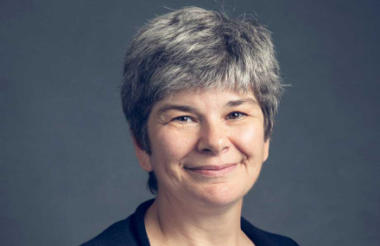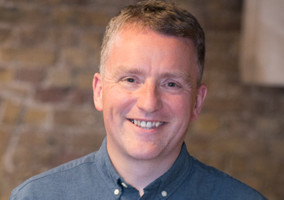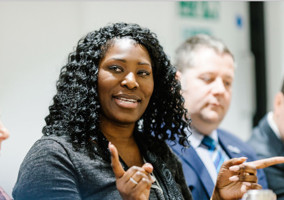Age UK's mission of reaching isolated older people has never been more important, according to its chief executive Steph Harland.
Clearly this year has brought new challenges, but also opportunities, when it comes to staying connected. But she believes Age UK, and other charities, have stepped up and delivered during the pandemic, which she hopes won't be forgotten once the crisis is over.
“I think Age UK is a phenomenal organisation. We've faced lots of change. Our mission is incredibly important, more than ever. There are huge issues confronting older people in our country and around the world,” she explains.
Our ambition has transformed over 40 years
Harland became chief executive of Age UK in January 2018, having previously been deputy chief executive at the charity.
A key theme in her career has been working with older people and other adults with care needs. After leaving school, she spent time volunteering in long-stay psychiatric hospitals where there were a lot of people with dementia, or who had had long-term mental health problems.
Here she witnessed people living “in conditions that we now would not see in this country, often in very large mixed-sex wards” which she found “very shocking”.
“I was quite young and it was a very rude awakening for me,” she says. “It was something that, in one way or another, I wanted to spend time in my life addressing,” she says.
She adds: “These long-stay hospitals went a long time ago, I'm pleased to say, although the community care that we thought would come afterward has not entirely materialised.”
According to Harland one of the “most positive developments” of the last 30 or 40 years “is that our ambition for what care can be like for older people has transformed since those times”.
Harland says: “Lots of older people in this country today are living interesting and diverse lives. They're huge contributors to our society and to our economy. They volunteer, they look after kids, they are active in lots of spheres that are interesting to them. They are advocates for causes that they care about. They are huge assets to their communities.”
Addressing inequalities
When Harland became chief executive, she did a “stocktake” with her trustees about the role of Age UK going forward.
She says: “One of the things we have to recognise is that we are facing a situation fairly soon when one in four people in our population will be an older person, by 2030. And we have to ask ourselves, who are we really here for, and what is it most important that we do?”
“When we look at older people in this country, there are significant inequalities between people who are doing the best, and those people who are doing the worst,” she adds.
Age UK is a federated structure and works with many local charities, but a lot of the ways in which those organisations were originally funded have “been gradually disappearing over time”.
“So there are some really important questions about the future of that vital network. And one of the things that we were most keen to focus on is how to secure the future for that fantastic work going on in communities across the country,” she says.
“Before Covid-19, I was very pleased with how things were going in the organisation,” she says, adding that the charity was “making good progress” on its goals.
The impact of Covid-19
When Covid-19 hit, Harland says she immediately thought “people are going to turn to us and expect us to be there for them”.
“They know who we are, they know where we are, and they're going to expect us to help them. So, we better get on and make sure that we do that,” she says.
The immediate focus was on how to best support people. That is, “what are the things that people are going to need, and how do we step up at this really important time”.
She adds: “We've got a fairly simple view, which is we needed to put older people first. And the important thing was not to get so distracted by the financial challenges that the organisation faced, that we forgot to focus on the most important thing.”
Finances at Age UK
Like most charities Age UK has been heavily impacted by the pandemic. Harland says: “In the organisation, we also faced some very real practical challenges because losing our shop income overnight was pretty big.”
Harland says: “The furlough scheme has been of enormous help to us, because of our charity shops. It has not been the solution for every charity, but for us, it has been extremely valuable, we will have received quite a large amount of money.”
In April, Age UK announced it was furloughing over 1,200 of its staff, amounting to approximately 70% of its workforce.
Age UK also ran an emergency appeal, and “were very happy” with the support it received from the public. The charity also received some government funds through its participation in the Big Night In appeal.
“We've concentrated on distributing those funds really quickly to those areas where our local partners are able to stand up services and support to older people,” she says.
Connecting older people with Age UK
Harland says that this year “we have seen something really interesting happening” as lots of older people, where they have the resources to do it, “had to make the jump to be more digital”.
“A lot of people who have been perhaps resistant in various ways to really engaging with digital technology, have taken to it. And one of the things we know over time about older people in digital technology is that where people are able to engage with it and they get into it, they can be massive enthusiasts for it,” she says.
People have gone to Age UK’s website in their millions, and their phone lines have been busy fielding calls throughout the pandemic.
Nonetheless, Harland is concerned about people the charity doesn't hear from because they don't know how to reach out. “Part of what preoccupies us a lot, is how do we get in touch with those people who are most disconnected?”
She says the surge in mutual aid groups and self-directed volunteers has been “brilliant”. Partly because volunteers have “brought people to us, who we perhaps have not connected with before”.
“But we do know that there are a lot of people out there who are very isolated. The more isolated someone becomes, the more it can be very difficult for them to put their hand up and say I'm here,” she says.
‘Room for improvement’ at Age UK
As well as reaching out to those who might not approach the charity, she is keen to make other changes.
Conversations around racism and diversity have been happening at Age UK, the national charity, and also in local Age UK’s across the country.
She says: “At Age UK there is definitely room for improvement. Like other charities at senior levels, we are very white.”
The chief executive says the charity understands that the population it serves is very diverse and will increasingly be so.
“BAME older people are experiencing racism and experience additional layers of disadvantage, often which are lifelong. This means that they, for example, are among the groups that the pandemic has affected the worst. And that's a matter of huge interest to people at Age UK,” she says.
Harland adds that the charity is having “passionate conversations internally” about the work it must do, and says “it requires serious systematic attention”.
As Age UK has “quite a big platform” Harland acknowledges a lot of people will see what it has to say.
Therefore, “it is not a question of a little passing fad” and Harland says “we need to be serious about anti-racist work”.
Looking to the future
During Covid-19, she has found support from the public “has been amazing”.
As far as the government is concerned, Harland says: “I think that many of us argued for a more comprehensive approach to the sector.”
That is an approach which looked at both the immediate task but also “this bigger point about our contribution to society and the economy.”.
She says: “What we have not seen is a comprehensive approach that many people have argued brilliantly for” but Harland thinks the Kruger report “gives us some sense of what the government might be thinking”.
“I really hope we as a sector can make sure that what we have demonstrated, and delivered, during this crisis is not forgotten. I think we have stepped up. I think we have played an absolutely essential role,” she concludes.
Related articles
Karl Wilding: ‘People want to change the world; our challenge is to show charities are the best way to do that’
Karl Wilding, chief executive of NCVO, tells Kirsty Weakley about the umbrella body’s new strategy, the challenges that lie ahead for the sector, the “moral imperative” to work collaboratively, and what keeps him optimistic about the future
Catherine Johnstone: 'When the chips are down people in communities will step forward'
Catherine Johnstone, chief executive of the Royal Voluntary Service, speaks to Harriet Whitehead about the NHS Volunteer Respondents scheme, the Kruger report, and leading in a crisis
Ndidi Okezie: 'Covid-19 has shone a spotlight on inequalities that charities have been trying to bang the drum on'
Ndidi Okezie, chief executive of UK Youth, speaks to Harriet Whitehead about her goals for the charity, the #YoungAndBlack campaign, and the importance of collaboration












